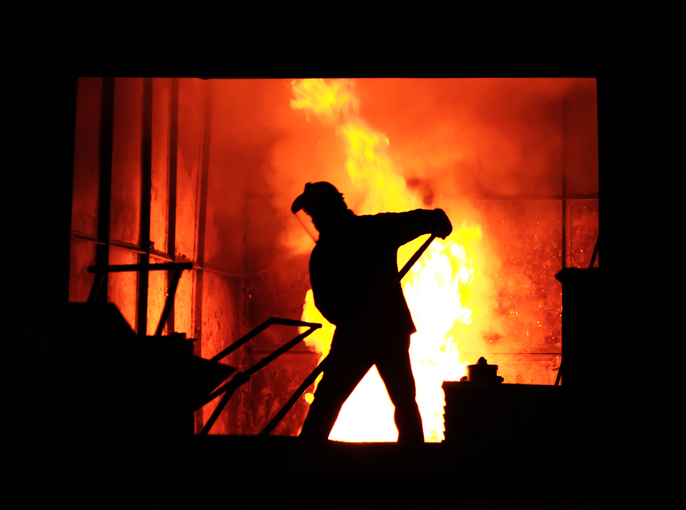Don’t Dawdle on Economic and National Security
The future of the American steel and aluminum industries is not a matter for dithering.
Each mill and smelter that remains operating is too vital. Each is too crucial to the economic viability of a corporation, a community, and thousands of workers and their families. Each also is too essential to national security, which relies on American-produced metals for critical infrastructure, from bridge construction to the electrical grid, and for munitions, from fighter jets to bullet-proof vests.
There is no more time for waiting. International trade law must be enforced now. Throughout his campaign, Donald Trump pledged his support to workers and these industries. And he followed through by launching within three months of taking office as president special investigations into the effects of steel and aluminum imports on national security. Such inquiries may take as long as a year to conclude, but the administration expedited the process. Until it didn’t. Now steel and aluminum corporations, their communities and their workers are being told to wait. It’s a delay that could kill more American mills and smelters.
The nation lost nine aluminum smelters over the past six years, leaving only five in the entire country, and most of them are now operating at reduced levels. Beginning in January 2015, steel companies laid off 14,000 workers as they closed mills and sections of mills. For example, Allegheny Technologies shuttered a plant that made grain oriented electrical steel in 2016, leaving only one U.S. company, AK Steel, now producing this component critical to electricity transmission.
As mills and smelters disappear, the military is further restricted in its ability to secure domestically produced essential metals in time of crisis.
The primary culprit in this scary scenario is overcapacity and overproduction in China, which overwhelms the world market with illegally subsidized, grossly underpriced aluminum and steel.
China has promised repeatedly to solve this problem. On Thursday it pledged again, this time contending it wanted to work globally to deal with the issue of aluminum overcapacity – a problem Beijing created. Over the past six years, using massive government subsidies, China quickly ramped up capacity to become the largest aluminum producer in the world.
China can’t be trusted on this because it never keeps its promises. It has never cut its steelmaking capacity after announcing again and again that it would. In negotiations last week, Trump cabinet members could not even get a specific commitment out of China to do it. There’s no evidence China will stop overproducing steel or aluminum now. Waiting is useless. And destructive to American manufacturing.
The American steel and aluminum industries have fought back, filing and winning dozens of trade cases against imports of specific products. But the resulting tariffs and other penalties imposed by the U.S. Commerce Department and U.S. International Trade Commission (ITC) didn’t solve the problem. Instead of paying U.S. tariffs, China shipped its government-supported excess of these products to other countries, artificially suppressing world prices and warping what is supposed to be a free market.
Also, this traditional process for seeking relief from unfair trade takes too long. More than a year may elapse before companies and workers get a final decision. And that will be for just one product, like aluminum extrusions, aluminum foil, welded stainless steel pressure pipe or corrosion-resistant steel, to name a tiny number of cases from recent years.
That’s part of what made the special investigations into steel and aluminum imports so attractive. If the U.S. Commerce Department determined under Section 232 of the Trade Expansion Act of 1962 that imports of steel and aluminum jeopardized national security, then the president could impose penalties broadly to ensure the country could meet its own needs. The effort might also spur allies to join the United States in finally pressuring China sufficiently to actually reduce capacity.
Although Section 232 allows for nine months of investigation, after which the President would have three months to determine a remedy, the administration promised quick action when it announced the inquiries in April. The steel report was to be completed by June 30, with a speedy decision by the president after that.
That suggested the administration understood this was urgent.
But June 30 came and went. Now there’s an official delay. The administration told the Wall Street Journal that the steel investigation is on hold until after health care reform, tax changes and infrastructure spending are accomplished. “We don’t want to do it at this moment,” the president said Tuesday of the steel case.
That’s devastating. Especially because steel imports have jumped 22 percent since Jan. 1, placing additional pressure on the American industry.
The delay occurs as efforts are made by a new company to reopen at least one potline at an aluminum smelter in New Madrid, Mo., that the now-bankrupt Noranda company idled last year. Postponing the Section 232 decision makes for uncertainty for these investors.
It also occurs as a Chinese company is trying to buy Aleris, an Ohio-based manufacturer that supplies aluminum for use in vital infrastructure and military applications. That Asian firm, China Zhongwang, is accused of dodging tariffs and is under civil and criminal investigation for possible smuggling, conspiracy and wire fraud by the Justice Department, Department of Homeland Security and Commerce Department.
Maybe the Aleris smelters would keep operating if China Zhongwang bought them, but at what risk to national security?
The delay occurs as companies that buy steel fear monger that tariffs or quotas would raise prices.
An expert, Stephen Koplan, chairman of the U.S. ITC under Presidents Bill Clinton and George W. Bush, says that’s hogwash. “Predictions of disaster were wrong 15 years ago when I chaired the ITC, and they are wrong again today,” he wrote in an op-ed in The Hill newspaper this week.
When President George W. Bush imposed tariffs and quotas on steel imports under Section 201 of the Trade Act of 1974, there was no price shock afterward, according to a study by the nonpartisan U.S. ITC. Here is what Koplan, who also served as an attorney at the Small Business Administration, wrote:
“Downstream industries were not devastated by higher steel prices. Nor was the U.S. economy thrown into depression. The U.S. steel industry, however, earned a much-needed relief as the result of action taken by the president that allowed it to restructure and reinvest for the long term. In other words, the Section 201 measures worked as intended.
“We are facing similar challenges again today. . .Now, however, U.S. national security is at great risk if firm action is not taken immediately. The U.S. primary aluminum industry is on the verge of disappearing entirely, and the U.S. steel industry is not far behind.”
AK Steel Corp. CEO Roger Newport agreed with Koplan’s assessment that this is not a time for dawdling, telling the Commerce Department in his testimony on the steel case:
“High-end electrical steel is an incredibly difficult product to manufacture, as it requires a significant amount of dedicated, capital equipment and a sophisticated, well-trained workforce. Therefore, if AK Steel were to exit the market, there would be no operational electrical steel manufacturing equipment in the United States, the specialized labor and related expertise in operations would be lost, and many of AK Steel’s talented operators and researchers would either relocate to other businesses, industries and/or foreign countries, or become unemployed.”
Workers’ and companies’ economic security is at risk. The nation’s security is at risk. Resolution of these cases should be speeded, not delayed.
***
Photo by Getty Images


